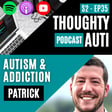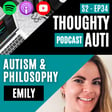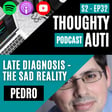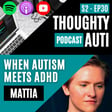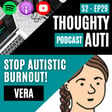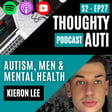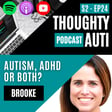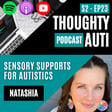
Autistic Man Talks To Mother About Childhood
What early signs of Autism did Thomas have in childhood? Why did Michelle choose to diagnose Thomas as Autistic? How does mental health impact Autistic children?
TW: Mental health
Michelle Henley is first and foremost, the host's mother. Starting off in the 90s as a special needs teacher, she worked up to a respectable role of a SEND lead for the Redcar & Cleveland Local Authority. She did a lot of work on educating mainstream teachers about Autism, but also parents through peer awareness.
My Links - https://linktr.ee/thomashenleyUK
Dbud Noise Cancelling Adjustable Ear Buds (20% Off with code: THOUGHTYAUTI) - https://dbud.io/thoughtyautipodcast
They kick off the conversation by talking about Michelle’s diagnosis of Vocal Dysphoria, before taking us through the signs of Autism that Michelle spotted in Thomas throughout the years. She highlighted that she felt exceptional at parenting, as her first child Thomas hardly cried and was very easy to look after… but like many other parents, she started to question whether this was typical for infants. He never communicated his needs and seemed to be utterly fascinated by colourful lights.
After a tough time integrating Thomas socially within the community and in school, and multiple incidents with sensory distress, she decided to take Thomas for an Autism diagnosis at 10 years old. Thomas & Michelle reflect on the moment Thomas was told he was Autistic. Michelle framed the Autism diagnosis as a difference, with both positives and negatives. Thomas appeared notably relieved to her surprise, with the host chipping in on his own feelings of alienation even at that young age.
Thomas experienced extensive bullying, mental illness, isolation and other difficulties in school. In a touching conversation, Michelle gave her thoughts and feelings around these difficult times… despite the affirmations of it all being an adolescent stage from other parents, Thomas started to withdraw from his happy-go-lucky personality. He ceased communication with his family, engaging in harming behaviours and sinking deep into emotional turmoil.
From his hardships to his success in multiple areas of life, Michelle describes Thomas’ life as a rollercoaster of incredible highs and catastrophic lows. They both bond over the joy they felt in his defining experiences and discuss the barriers to supporting Autistic people socially within education.
As a round-up to the eye-opening conversation, Michelle highlights some key difficulties with supporting Autistic children through life. They talk about the differences between behavioural-based parenting and a more holistic relational style of parenting Autistic children. She leaves us with some lessons on how parents should view Autism and their approach to helping Autistic children experience the world.
This has been an emotional and touching episode with both mother and son giving their perspectives on the Autistic experience of one man.
Song Of The Day (Listen Here) - https://open.spotify.com/playlist/5UDIyN5TSYN4zMcRoQPrG8?si=9255ed3480d840b5








